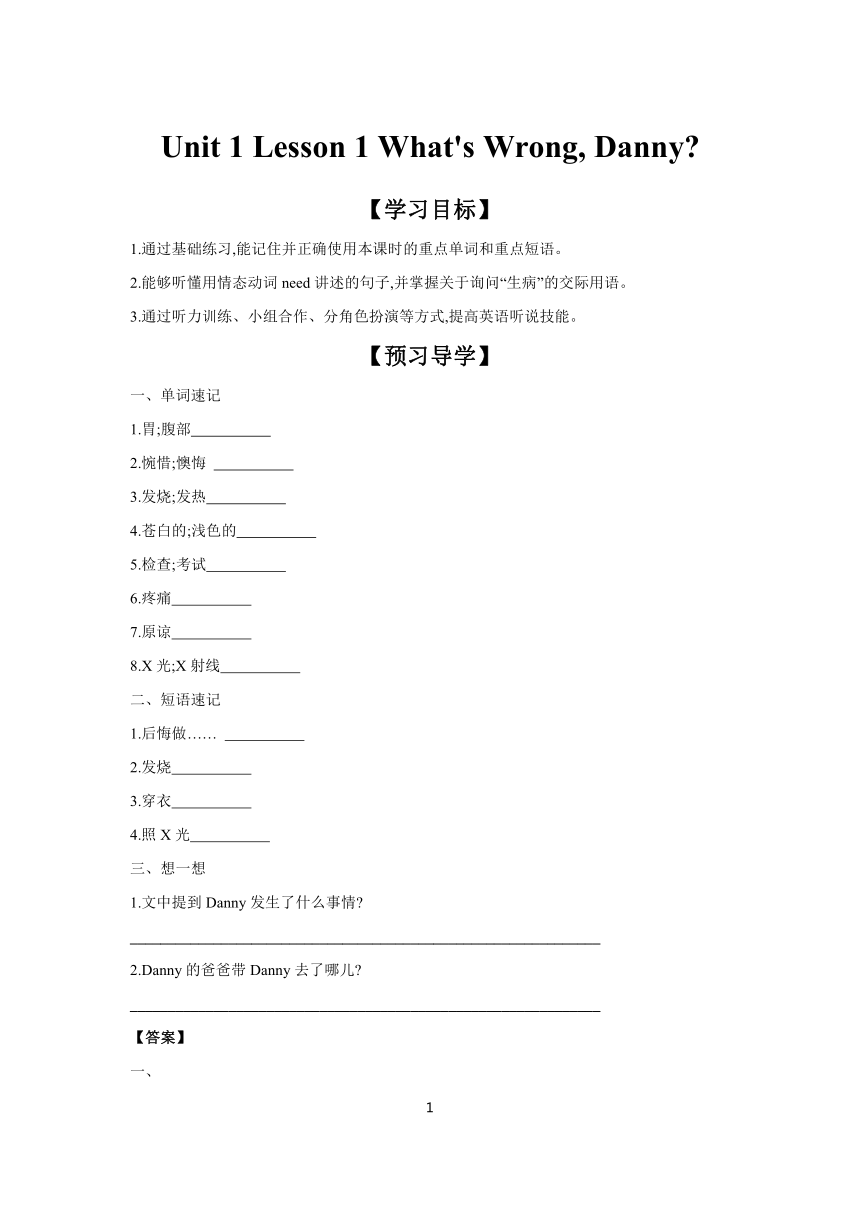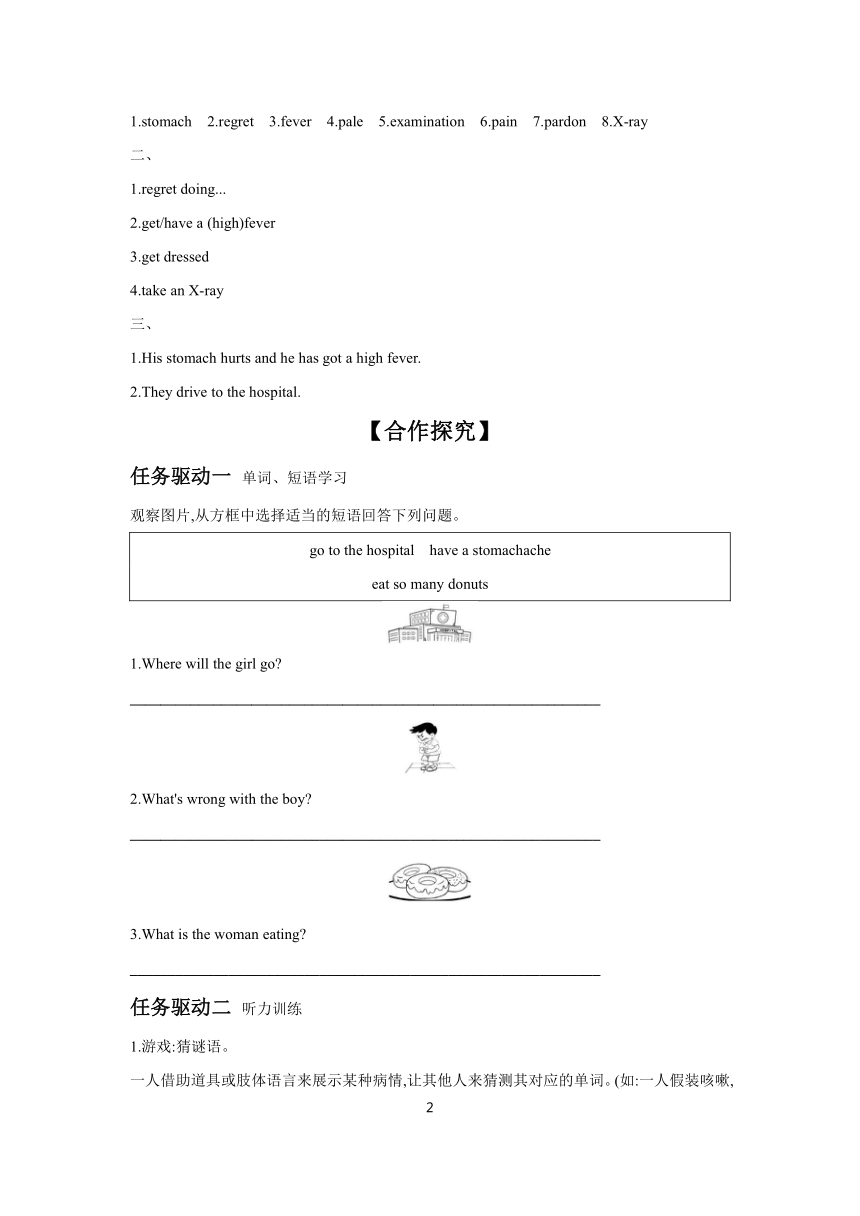Unit 1 Lesson 1 What's Wrong, Danny?学案(含答案)
文档属性
| 名称 | Unit 1 Lesson 1 What's Wrong, Danny?学案(含答案) |

|
|
| 格式 | docx | ||
| 文件大小 | 36.1KB | ||
| 资源类型 | 教案 | ||
| 版本资源 | 冀教版 | ||
| 科目 | 英语 | ||
| 更新时间 | 2024-02-28 00:00:00 | ||
图片预览


文档简介
Unit 1 Lesson 1 What's Wrong, Danny
【学习目标】
1.通过基础练习,能记住并正确使用本课时的重点单词和重点短语。
2.能够听懂用情态动词need讲述的句子,并掌握关于询问“生病”的交际用语。
3.通过听力训练、小组合作、分角色扮演等方式,提高英语听说技能。
【预习导学】
一、单词速记
1.胃;腹部
2.惋惜;懊悔
3.发烧;发热
4.苍白的;浅色的
5.检查;考试
6.疼痛
7.原谅
8.X光;X射线
二、短语速记
1.后悔做……
2.发烧
3.穿衣
4.照X光
三、想一想
1.文中提到Danny发生了什么事情
______________________________________________________________
2.Danny的爸爸带Danny去了哪儿
______________________________________________________________
【答案】
一、
1.stomach 2.regret 3.fever 4.pale 5.examination 6.pain 7.pardon 8.X-ray
二、
1.regret doing...
2.get/have a (high)fever
3.get dressed
4.take an X-ray
三、
1.His stomach hurts and he has got a high fever.
2.They drive to the hospital.
【合作探究】
任务驱动一 单词、短语学习
观察图片,从方框中选择适当的短语回答下列问题。
go to the hospital have a stomachache
eat so many donuts
1.Where will the girl go
______________________________________________________________
2.What's wrong with the boy
______________________________________________________________
3.What is the woman eating
______________________________________________________________
任务驱动二 听力训练
1.游戏:猜谜语。
一人借助道具或肢体语言来展示某种病情,让其他人来猜测其对应的单词。(如:一人假装咳嗽,其他人猜测出单词为“cough”。)
2.听课本听力内容完成下面的短文。
Danny feels (1) because he ate so many donuts. Mr. Dinosaur advises him to go to the hospital. Danny's (2) and Danny get to the hospital by (3) . A nurse takes him to a(n) (4) room. A doctor feels Danny's stomach. Then the doctor asks Danny to stay in the hospital that night and takes an (5) . It's going to be OK.
3.再听一次课本内容,把听到的词组填入表格中。
序号 词组
1
2
3
... ...
4.根据上面的表格造句。
序号 词组 造句
1
2
3
... ... ...
◎学法指导:1.运用“What's wrong/What's the matter with... /How do you feel /How are you feeling ”等句型来询问病情;2.正确运用have a cold/fever/headache/stomachache等来描述病情。
任务驱动三 情景演练
完成任务所需的语言结构:
The doctor may ask: How are you feeling /What's the matter /What's wrong
You may tell the doctor: I've got a pain here./ I have a fever./ I have a stomachache.
The doctor may say: Don't worry./ It's going to be OK./ You need to stay in the hospital./ We need to take an X-ray.
【答案】
任务驱动一
1.She will go to the hospital.
2.He has a stomachache.
3. She is eating so many donuts.
任务驱动二
2.(1)stomachache (2)father (3)car (4)examination (5)X-ray
3.feel well regret eating so many donuts
4.feel well
I feel well after I drink some hot water.
regret eating
My sister regrets eating three bananas.
so many donuts
There are so many donuts in the shop.
【知识超市】
[命题点]I regret eating so many donuts now. 现在我后悔吃了那么多面包圈。
1.regret作动词,意为“遗憾,后悔”。 regret doing sth. 意为“后悔做了某事”,某事已经做过;regret to do sth.意为“对要做某事感到遗憾”,某事还没有做;regret后还可接从句。如:
I regret selling the house. 我后悔卖了房子。
I regret to tell you that I won't be able to attend the meeting. 我很遗憾地告诉你,我不能参加这次会议。
She regrets what she did. 她后悔她所做的事情。
2.regret还可作名词,意为“遗憾,后悔”。 如:
He said he had no regret about working in the factory. 他说他不后悔在工厂工作。
◎用法总结:
regret既可作名词,也可作动词。作动词的时候,后面可跟动名词,也可跟动词不定式,但是两者之间有区别。regret后还可接从句。
对点自测
用所给单词的适当形式填空。
1.Sue has a stomachache. She regrets (eat) so many cookies.
2.I regret (say) that we cannot stay here any longer.
【答案】
1.eating 2.to say
2
【学习目标】
1.通过基础练习,能记住并正确使用本课时的重点单词和重点短语。
2.能够听懂用情态动词need讲述的句子,并掌握关于询问“生病”的交际用语。
3.通过听力训练、小组合作、分角色扮演等方式,提高英语听说技能。
【预习导学】
一、单词速记
1.胃;腹部
2.惋惜;懊悔
3.发烧;发热
4.苍白的;浅色的
5.检查;考试
6.疼痛
7.原谅
8.X光;X射线
二、短语速记
1.后悔做……
2.发烧
3.穿衣
4.照X光
三、想一想
1.文中提到Danny发生了什么事情
______________________________________________________________
2.Danny的爸爸带Danny去了哪儿
______________________________________________________________
【答案】
一、
1.stomach 2.regret 3.fever 4.pale 5.examination 6.pain 7.pardon 8.X-ray
二、
1.regret doing...
2.get/have a (high)fever
3.get dressed
4.take an X-ray
三、
1.His stomach hurts and he has got a high fever.
2.They drive to the hospital.
【合作探究】
任务驱动一 单词、短语学习
观察图片,从方框中选择适当的短语回答下列问题。
go to the hospital have a stomachache
eat so many donuts
1.Where will the girl go
______________________________________________________________
2.What's wrong with the boy
______________________________________________________________
3.What is the woman eating
______________________________________________________________
任务驱动二 听力训练
1.游戏:猜谜语。
一人借助道具或肢体语言来展示某种病情,让其他人来猜测其对应的单词。(如:一人假装咳嗽,其他人猜测出单词为“cough”。)
2.听课本听力内容完成下面的短文。
Danny feels (1) because he ate so many donuts. Mr. Dinosaur advises him to go to the hospital. Danny's (2) and Danny get to the hospital by (3) . A nurse takes him to a(n) (4) room. A doctor feels Danny's stomach. Then the doctor asks Danny to stay in the hospital that night and takes an (5) . It's going to be OK.
3.再听一次课本内容,把听到的词组填入表格中。
序号 词组
1
2
3
... ...
4.根据上面的表格造句。
序号 词组 造句
1
2
3
... ... ...
◎学法指导:1.运用“What's wrong/What's the matter with... /How do you feel /How are you feeling ”等句型来询问病情;2.正确运用have a cold/fever/headache/stomachache等来描述病情。
任务驱动三 情景演练
完成任务所需的语言结构:
The doctor may ask: How are you feeling /What's the matter /What's wrong
You may tell the doctor: I've got a pain here./ I have a fever./ I have a stomachache.
The doctor may say: Don't worry./ It's going to be OK./ You need to stay in the hospital./ We need to take an X-ray.
【答案】
任务驱动一
1.She will go to the hospital.
2.He has a stomachache.
3. She is eating so many donuts.
任务驱动二
2.(1)stomachache (2)father (3)car (4)examination (5)X-ray
3.feel well regret eating so many donuts
4.feel well
I feel well after I drink some hot water.
regret eating
My sister regrets eating three bananas.
so many donuts
There are so many donuts in the shop.
【知识超市】
[命题点]I regret eating so many donuts now. 现在我后悔吃了那么多面包圈。
1.regret作动词,意为“遗憾,后悔”。 regret doing sth. 意为“后悔做了某事”,某事已经做过;regret to do sth.意为“对要做某事感到遗憾”,某事还没有做;regret后还可接从句。如:
I regret selling the house. 我后悔卖了房子。
I regret to tell you that I won't be able to attend the meeting. 我很遗憾地告诉你,我不能参加这次会议。
She regrets what she did. 她后悔她所做的事情。
2.regret还可作名词,意为“遗憾,后悔”。 如:
He said he had no regret about working in the factory. 他说他不后悔在工厂工作。
◎用法总结:
regret既可作名词,也可作动词。作动词的时候,后面可跟动名词,也可跟动词不定式,但是两者之间有区别。regret后还可接从句。
对点自测
用所给单词的适当形式填空。
1.Sue has a stomachache. She regrets (eat) so many cookies.
2.I regret (say) that we cannot stay here any longer.
【答案】
1.eating 2.to say
2
同课章节目录
- Unit 1 Stay Healthy
- Lesson 1 What's Wrong,Danny?
- Lesson 2 A Visit to the Dentist
- Lesson 3 Good Food, Good Health
- Lesson 4 Don't Smoke, Please!
- Lesson 5 Jane's Lucky Life
- Lesson 6 Stay Away from the Hospital
- Unit Review
- Unit 2 Great People
- Lesson 7 What Is the Meaning of Lift?
- Lesson 8 A Universe of Thought
- Lesson 9 China's Most Famous "Farmer"
- Lesson 10 Touch the World
- Lesson 11 To China, with Love
- Lesson 12 Guess My Hero!
- Unit Review
- Unit 3 Safety
- Lesson 13 Be Careful,Danny!
- Lesson 14 Accidents Happen
- Lesson 15 My Helmet Saved My Life!
- Lesson 16 How Safe Is Your Home?
- Lesson 17 Staying Safe in an Earthquake
- Lesson 18 Never Catch a Dinosaur
- Unit Review
- Unit 4 Stories and poems
- Lesson 19 A Story or a Poem?
- Lesson 20 Say It in Five
- Lesson 21 The Fable of the Woodcutte
- Lesson 22 The Giant(Ⅰ)
- Lesson 23 The Giant(Ⅱ)
- Lesson 24 Writing a Poem
- Unit Review
- Unit 5 Look into Science
- Lesson 25 Let's Do an Experiment!
- Lesson 26 Keep the Candle Burning
- Lesson 27 Planet Danny
- Lesson 28 The Study of Living Things
- Lesson 29 DNA—The Story of You
- Lesson 30 Science Affects Us
- Unit Review
- Unit 6 Movies and Theate
- Lesson 31 A movie or a Play
- Lesson 32 Moving Pictures
- Lesson 33 The Fisherman and the Goldfish(Ⅰ)
- Lesson 34 The Fisherman and the Goldfish(Ⅱ)
- Lesson 35 Theatres Are Fun!
- Lesson 36 Making Plays Is Fun
- Unit Review
